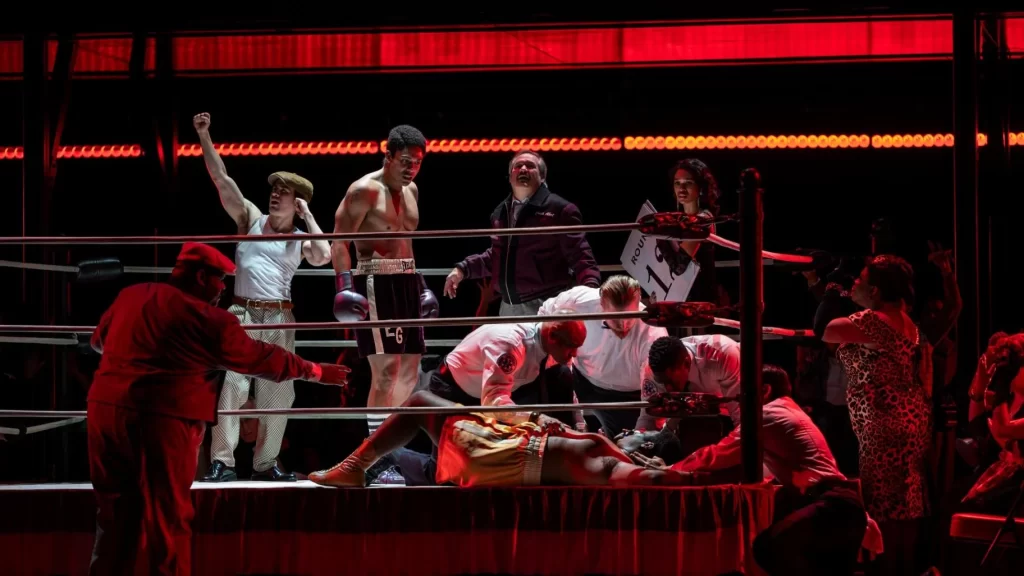
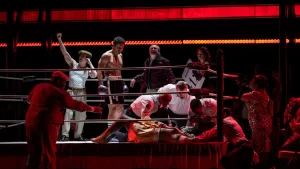 ***** Emile Griffith, the reluctant boxer who accidentally killed an opponent on his way to becoming champion and was haunted by it for the rest of his life and especially as he slipped into injury-induced dementia, makes a fascinating figure for biographies. His tragedy could be described as operatic, but to tell it requires a musical style and ear for dialogue that matches his Virgin Islands origins and place in New York’s LGBT community. Such an opera debuted in 2013, shortly before Griffith’s death, and Champion, an “opera in jazz” composed by Terence Blanchard with a libretto by Pulitzer Prize winner Michael Cristofer, is now being performed at the Lyric Opera of Chicago for the first time. A deeply moving work, this production, directed by James Robinson, conducted by Lyric music director Enrique Mazzola, and co-produced with the Metropolitan Opera, spares no expense in broadening the stories opera is used to tell.
***** Emile Griffith, the reluctant boxer who accidentally killed an opponent on his way to becoming champion and was haunted by it for the rest of his life and especially as he slipped into injury-induced dementia, makes a fascinating figure for biographies. His tragedy could be described as operatic, but to tell it requires a musical style and ear for dialogue that matches his Virgin Islands origins and place in New York’s LGBT community. Such an opera debuted in 2013, shortly before Griffith’s death, and Champion, an “opera in jazz” composed by Terence Blanchard with a libretto by Pulitzer Prize winner Michael Cristofer, is now being performed at the Lyric Opera of Chicago for the first time. A deeply moving work, this production, directed by James Robinson, conducted by Lyric music director Enrique Mazzola, and co-produced with the Metropolitan Opera, spares no expense in broadening the stories opera is used to tell.
We first see Emile Griffith as an old man (played by baritone Reginald Smith, Jr.), who is distressed that he can’t remember where he put down his shoes. He flounders a bit until being rescued by his caretaker and adopted son, Luis Rodrigo Griffith (tenor Martin Luther Clark). This is an important day for Emile, as he is supposed to meet with Benny Paret, Jr. (usually baritone Leroy Davis, but baritone Sankara Harouna at the performance I attended), the son of the man he beat into a fatal coma in the ring after Paret, Sr. called him an anti-gay slur. The old Emile’s mind always wanders, and today it has particular reason to drift back to the beginning of his adult life, when he moved from Saint Thomas to New York City, having never felt entirely at home where he was born. The young Emile (baritone Justin Austin), wanted to be a baseball player, although he also seems genuinely excited about a career making women’s hats. Part of the reason he picked New York is that it was home to his mother, Emelda (soprano Whitney Morrison), although he hadn’t seen her in many years, and she initially mistakes him for a different son. She introduces him to milliner and frustrated boxing coach Howie Albert (tenor Paul Groves), who is more interested in Emile’s athletic physique than anything else, and Emelda demands that her son not pass up this chance to grab a golden ring just because he wanted a different one.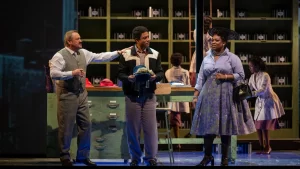
Blanchard’s music uses melodies that are understated most of the time, except for a few key dramatic points. In Act II, Emelda has a melancholic aria about selfish, desperate choices she was forced into in which she is accompanied only by a bass, one of the instances in which the score most overtly shows its jazz influence. Another of the memorable arias, sung by child Emile (Naya Rosalie James) after being beaten by his abusive religious fanatic cousin, is about how he hopes the devil the cousin says is inside him will make him strong. Outside of those few moments, the music helps drive forward the plot and much of the character work is done through Michael Cristofer’s libretto. Personally, I found it incredibly refreshing to get to experience an opera in English in which word choices convey so much specificity, something not always possible in how older works are presented. Emelda is eloquent and persuasive, having one song made up entirely of clever rhymes. Old Emile’s free association has its own kind of poetry. In contrast, Young Emile has a duet in Act II with a man he meets in a bar and hooks up with (baritone Ian Rucker) in which the words they use to express desire are almost totally subsumed into sounds.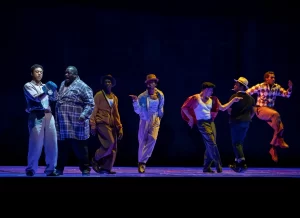
Champion succeeds on the strength of its singing actors, and the interplay between the old and young Emiles is the emotional core of the show. Though he remained a hero in the boxing world even as brain damage led him to decline and retire, Old Emille continued to be haunted by his guilt over Paret’s death and was never safe from homophobic violence. Neither Emile as an old or young man can help the other fully decide whether it was all worth it, but they do build up to one of the most cathartic endings I’ve experienced through this genre. Montana Levi Blanco’s costumes, Allen Moyer’s sets, and Donald Holder’s lighting all create a vibrant, fast-paced world that easily morphs between the Virgin Islands, Madison Square Garden, and a secret drag bar.
Enrique Mazzola, conducting a modern score at the Lyric for the first time, proves himself to be skilled at handling a wide range of styles. Champion is still a relatively recent work whose take-off was significantly disrupted by the pandemic, and there aren’t a whole lot of recordings of it. For anybody interested in contemporary opera, this is an opportunity to hear it done in a loving and carefully considered presentation. For those who enjoy musical theatre but don’t normally think of opera as their thing, Champion avoids a lot of the barriers for entry that might exist for older or non-naturalistic works and is immediately relevant.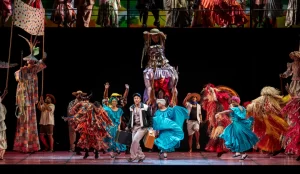
Champion will continue at the Lyric Opera House, 20 N Upper Wacker Drive, Chicago, thru February 11, with the following showtimes:
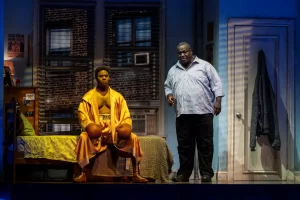 February 6 7:30 pm
February 6 7:30 pm
February 9 7:30 pm
February 11 7:30 pm
Running time is two hours and forty-five minutes with one intermission. There is also a thirty-minute preview talk an hour before the show.
Performances are in English with supertitles.
Ticket prices start at $49. The Lyric offers parking deals with Poetry Garage at 201 W Madison St. if inquired about in advance. To order, visit LyricOpera.org or call 321-827-5600.
To see what others are saying, visit www.theatreinchicago.com go to Review Round-Up and click “Champion.”


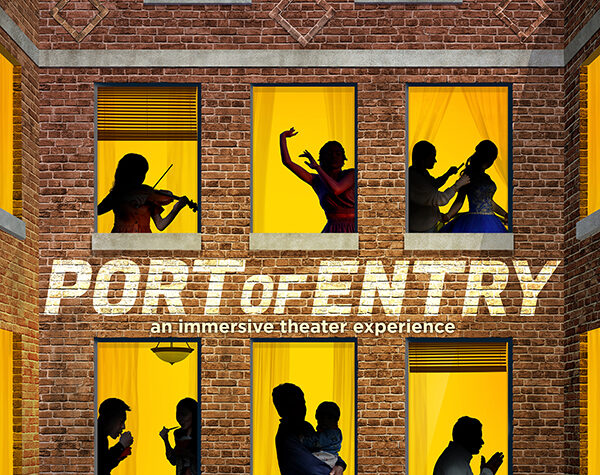

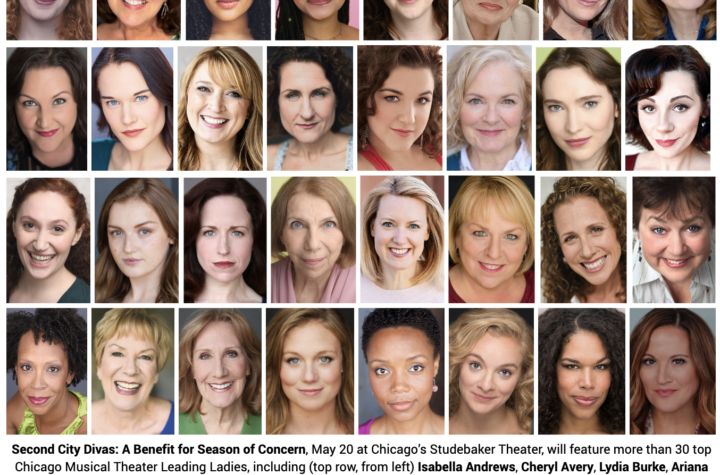

More Stories
“The Thanksgiving Play”
“Jump” reviewed by Julia W. Rath
“Judgement Day”